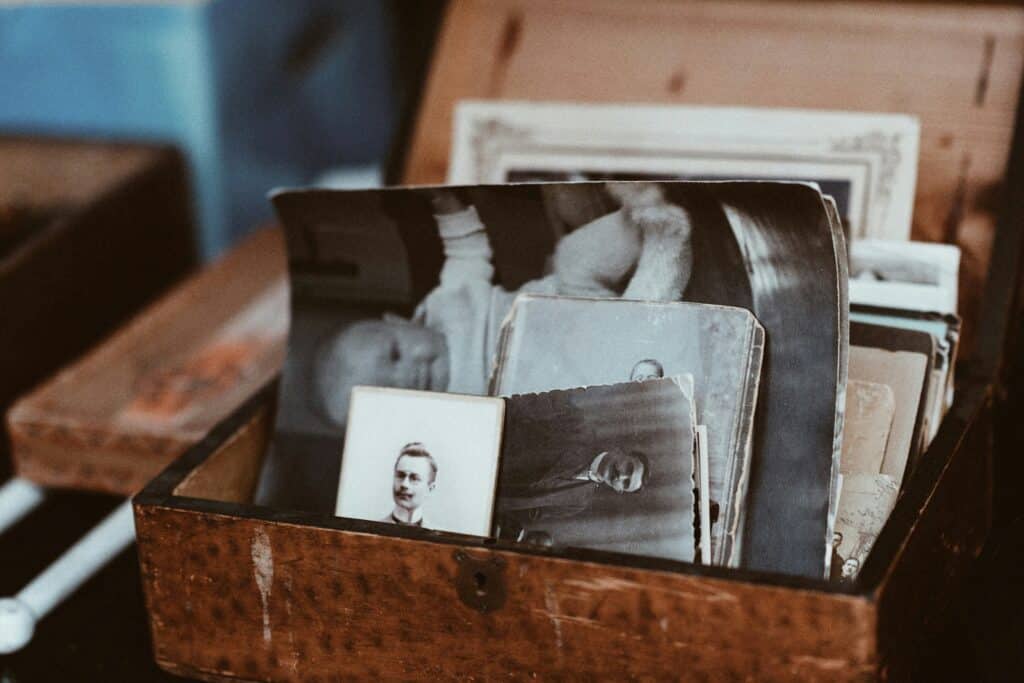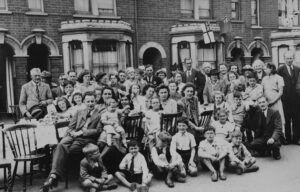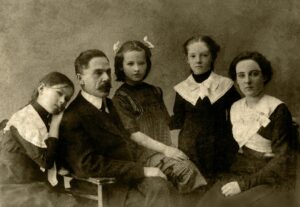In an age when the pace of life seems to be endlessly accelerating, taking time out to satisfy your curiosity about the history of your family can be profoundly rewarding. There are, however, many more great reasons to consider taking a deep dive into this eternally popular hobby.
In this article, we look at how the act of embracing your past can enrich your present, and we look at some well-known personalities who exemplify why this is so.
Why time spent on family history will be worth every moment
Researching your family history goes beyond merely satisfying the curiosity we feel about our hidden pasts – it opens doors to unexpected insights and connections. Here are 10 compelling reasons why this can be so rewarding.
1. You’ll gain a deeper understanding of your heritage
Every family is its own unique repository of cultural traditions, language, cuisine and folklore. Researching your family’s history gives you a chance to learn about your own cultural heritage and to make sense of the traditions and values that previous generations have passed down to you.
You might, for instance, uncover cultural practices and customs that your ancestors followed. You might learn about the languages they spoke, the events that shaped their lives and the societies in which they lived. All this can provide context for why certain values and customs are emphasised in your family today. It can instil a deeper appreciation for – and a sense of pride in – your family’s heritage and reinforce the significance of honouring family traditions into the future.
Ultimately, understanding your heritage helps to bridge the past and the present and to preserve and perpetuate it for future generations.
On the television program Who Do You Think You Are?, writer and comedian Stephen Fry explored the traditions and cultural practices of his Jewish ancestors in Hungary. This connection to his family’s past provided him with a deeper understanding of the traditions that shaped his family’s values and cultural identity.
2. You’ll connect with your relatives
Exploring family history often involves connecting with relatives near and far. Rekindling relationships with extended family members and exploring the ties that bind you can forge and strengthen these bonds.
It is not unknown for family-history researchers to form connections with family members they’ve never met and even, in some cases, to discover relatives they never knew existed!
When politician Bernie Sanders and comedian Larry David appeared on Finding Your Roots, they discovered that they are distantly related – a revelation that was surprising and amusing to both men!
3. You’ll preserve your family’s unique stories
Family history is about so much more than just names, dates and places. Look beyond the raw essentials of genealogy – the birth, marriage and death details – and you’ll soon come across tales of adventure, resilience and challenge. These stories won’t always be epic or earth-shattering – the best ones often emerge from times of hardship and the most ‘everyday’ of settings – but they will almost always be fascinating.
Remember that no matter how ‘ordinary’ your life or other people’s lives might, at first, seem, we all experience our own fair share of highs and lows. Hence, there are stories waiting to be told. Preserve these stories, and you’ll create not just an enduring family legacy but a point of reference that you and your family can turn to when faced with tough times of your own.
During an episode of Finding Your Roots, actor Marisa Tomei discovered that she is related to her former co-star Julianne Moore. Genealogical research often relies on oral traditions passed down through generations, and the preservation of family stories played a crucial role in her discovery. It was through the preservation and exploration of family stories that Tomei and Moore uncovered their unexpected connection.
4. You might unearth medical histories
Understanding familial health patterns and genetic predispositions can be invaluable for active health awareness and management, and researching your family history is one way of achieving that. Having knowledge of hereditary conditions, in particular, can empower you to recognise patterns of illness that might be present in your lineage, to make more informed decisions and to take preventative measures.
Flesh and Blood: A History of My Family in Seven Maladies, written by actor Stephen McGann, powerfully expresses this idea. In the book, McGann explores his family’s medical history through the generations. He uncovers patterns of illness that have impacted his family and demonstrates how understanding your family’s medical history can provide insights into your own health risks and conditions.
5. You’ll improve your well-being
Staying with the subject of health, academics have shown that learning about and relating to those who came before can improve your own psychological well-being. For example, Susan Moore, a professor at Swinburne University of Technology, has observed the healing and therapeutic aspects of ancestral storytelling.
Other research has shown that, at a time when anxiety is becoming increasingly prevalent among people of all ages and backgrounds, studying family history can boost psychological health. In a study published in The Journal of Genealogy and Family History, academics from Brigham Young University discovered that researching family history reduces anxiety by a tremendous 20 per cent, increases self esteem by 8 per cent and encourages the development of personal resilience.
Former First Lady of the USA Michelle Obama has publicly shared her journey of understanding her family’s history. During research for her book Becoming, she discovered that her great-great-grandfather was a slave who escaped to freedom. This discovery, and her understanding of the resilience and the struggles of her ancestors, provided Obama with a profound sense of connection and strength. This illustrates how uncovering your roots can enhance psychological well-being. Obama has since highlighted the importance of family history in fostering a sense of identity and emotional health. She encourages others to explore their own heritage for this reason.
6. You’ll develop your senses of identity and belonging
Studies have shown that by helping to define who you are and what constitutes your place in the world, researching your family history can actively shape your identity and your senses of belonging and self. It can anchor you to a broader or sometimes new familial narrative that often has the capacity to provide strength in challenging times.
On Finding Your Roots, actor Julia Roberts discovered that her real surname isn’t Roberts, but Mitchell. Her great-great-grandfather was actually a man named Henry McDonald Mitchell Jr., not Willis Roberts, whose name she carries. This revelation significantly impacted her sense of identity and highlighted how genealogical research can uncover hidden truths and reshape your understanding of belonging and self. Despite the surprising discovery, Roberts expressed that she still felt connected to the Roberts name, illustrating how complex and personal the journey of understanding your identity can be.
7. You’ll appreciate your family geography
Chances are, the exploration of your family history will throw up things you never knew about the journeys of migration, settlement and adaptation that shaped your lineage. You might find, for instance, that you’re descended from a convict who was sent from Britain to Australia, a pioneer who braved the American frontier, a soldier who served on the battlefields of North Africa and Europe or a family that has been steadfastly rooted to one area for generations. You might discover connections to a remote trading post on Hudson Bay, a farming village in the Yorkshire Dales, or the big cities of China.
Wherever your ancestors went and whatever location they called ‘home’, learning about those places can strengthen your own connection to – and your feelings about – them and make your family history an exciting adventure.
When actor George Clooney researched his family history, he discovered that he is related to Abraham Lincoln and learnt that they share deep roots in Kentucky. Connections, like these, to significant historical figures and places can enhance your appreciation for your family’s journey and its geographical roots.
8. You could uncover surprises and mysteries
Many people start researching their family history by wondering what skeletons they might find in the cupboard, and it’s true – research does sometimes reveal unexpected revelations and mysteries. Whether you uncover long-lost relatives or hidden family secrets, these discoveries can certainly add layers of complexity and intrigue to the narrative!
While family history research can lead to delightful surprises and unexpected twists, however, do be prepared for potential pitfalls as well. Revelations might challenge your perceptions or bring to light uncomfortable truths.
On Who Do You Think You Are?, actor and comedian Nick Offerman traced his roots back to the Mohawk Nation, uncovering long-lost family connections and solving some lingering family mysteries. Exploring family history can provide clarity and resolution to these intriguing puzzles.
9. You’ll learn
Tracing your ancestry requires the skills of a detective – the abilities to research, to think critically and to solve problems, and others besides – but it can also help develop them. In short, the more you do, the smarter you’ll become.
Researching your family history can be a fascinating learning experience. As well as boosting your skill set, it can spark completely new interests and create opportunities to explore other topics, such as local history, migration patterns and military history.
Actor and writer Andrew McCarthy embarked on a journey to explore his Irish heritage, which he documented in his book A Song for Ireland. His research took him to the ‘Emerald Isle,’ where he walked in the footsteps of his ancestors and learnt about the historical and cultural contexts that shaped their lives. McCarthy’s exploration of his family’s past not only enriched his understanding of Irish history but also honed his research and storytelling skills.
10. And finally, you’ll have fun – honestly!
Our reasons for doing something don’t always have to be ambitious or ‘worthy’. Sometimes, we do things just because they’re fun. And, believe it or not, family history is fun!
The broadening appeal of family history in recent years bears this out. Traditionally seen as an older person’s pursuit, it is now embraced by young and old alike. It is an engrossing, absorbing, compelling hobby that people can enjoy not only as they transition from work to retirement but at any stage of life. This growing appeal is thanks, in large part, to television programmes such as Long Lost Family, Genealogy Roadshow, Finding Your Roots and Who Do You Think You Are?, which make plain the joy and, sometimes, the pain, of family history.
Another factor in family history’s growing popularity has been the increasing ease of going about it. Like any hobby, it has its frustrations: the dead ends and brick walls and the need for patience, persistence and hard work. Added to these frustrations used to be the need for endless trips to libraries and archives, the inevitable head-scratching about what records were available, and where, and the waiting for documents to turn up in the post. Websites such as Ancestry and Findmypast, however, have completely changed the game. By providing easy access to search tools and to vast, ever-expanding databases and record sets, they have revolutionised research and hugely reduced the amount of time and effort that it requires.
These well-known resources, however, are just the tip of the iceberg. DNA testing, which makes it possible to find connections with relatives you had no idea even existed, is another great angle of family history worth exploring. Many DNA companies, including AncestryDNA, MyHeritage, FamilyTreeDNA and 23andMe, will be only too happy help. You have to pay for their services, of course, but the information they provide can open doors that would otherwise remain firmly closed.
Countless other resources, such as Cyndi’s List and the various family history forums and national archive websites around the world can not only be of assistance but also serve as the doorway to your new hobby and to communities of friendly, helpful people who share your enthusiasm for digging into the past.
Just do it!
The benefits of knowing your family history can resonate deeply, and the journey of exploring your familial roots can be one of self-discovery, connection and cultural preservation. By unravelling the threads of your past and embracing your family history, you will honour the legacies of those who came before and enrich your own understanding of identity, belonging and resilience.
Written by Stephen Pitts, LifeBook Memoirs editor






